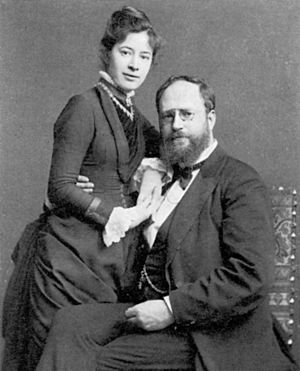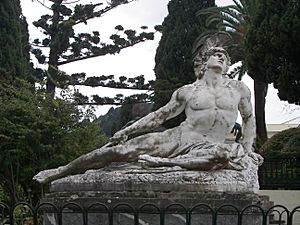Ernst Herter facts for kids
Ernst Gustav Herter (born May 14, 1846, in Berlin, Germany – died December 19, 1917, in Berlin) was a famous German sculptor. He was known for creating beautiful statues, especially ones of characters from old myths and legends.
One of his most famous works is called Sterbender Achill, which means Dying Achilles. He made this statue in Berlin in 1884. The Empress of Austria bought it for her palace, Achilleion, in Corfu, Greece. It became a very important part of her palace.
There is also a second original Dying Achilles statue by Ernst Herter. You can find it in Elbląg, Poland, across from the City Hall. This statue was a gift from the German Ministry of Culture and Arts.
Contents
Becoming a Sculptor
Ernst Herter studied art at the Academy of Arts in Berlin. He also learned from other famous sculptors like Ferdinand August Fischer, Gustav Blaeser, and Albert Wolff.
In 1869, he opened his very own art studio. A few years later, in 1875, he traveled to Italy to study more art. He later became a member of the Prussian Academy of Arts, which was a big honor.
Famous Sculptures
Ernst Herter created many amazing sculptures during his life. He was especially good at bringing mythological figures to life in stone.
The Lorelei Fountain
One of Herter's well-known works is the Lorelei Fountain. This sculpture was made to honor the German writer Heinrich Heine. It was first meant to be placed in Heine's hometown of Düsseldorf, Germany. This was to celebrate 100 years since his birth.
However, because of strong negative feelings against Jewish people and too much focus on German pride at that time, the fountain could not be placed in Germany. Instead, it was unveiled in the Bronx, New York City, on July 8, 1899. Ernst Herter himself was there for the unveiling ceremony.
-
The Lorelei Fountain, a memorial sculpture for Heinrich Heine in the Bronx, New York City
Other Notable Works
Herter also created a statue of the famous scientist Hermann von Helmholtz. His sculptures can be found in different cities, showing his wide range of work.
Images for kids
-
Orpheus, 1902 Berlin-Wedding
-
The Muse Terpsichore, 1909, Thorn
See also
 In Spanish: Ernst Herter para niños
In Spanish: Ernst Herter para niños
 | Precious Adams |
 | Lauren Anderson |
 | Janet Collins |







